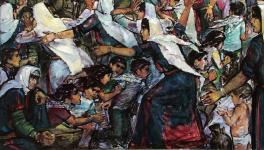Palestinian Women Become Breadwinners Under Occupation
The World Bank (WB) warned over a year ago that unless Israel eased its restrictions on movement and access in the West Bank the Palestinian economy would further deteriorate.
In February the WB released another report, "Checkpoints and Barriers: Searching for Livelihoods in the West Bank and Gaza, Gender Dimensions of Economic Collapse." The report outlines the devastating impact Israel's occupation has caused to Palestinians financially, and women in particular.
As many Palestinian men -- the traditional breadwinners -- have been imprisoned, killed or injured by the Israeli military, Palestinian women have been increasingly forced to find new and novel ways to feed their families and keep a roof over their heads.
"High rates of unemployment and poverty have forced many women to become the breadwinners for their families due to many Palestinian men being imprisoned for political offenses and unemployed," says Reem Abboushi, executive director of Asala or The Palestinian Business Women's Association.
"Many women have also been widowed with large families to raise. Earning money can mean the difference between starvation and survival for these women and their families," Abboushi told IPS.
Asala, based in the central West Bank city of Ramallah, was established in 1997 as a micro-financing organization aimed at empowering Palestinian women through financing their business ventures.
"We specifically chose to help female entrepreneurs because otherwise over 90 percent of our loans would have gone to men who have more business experience," says Abboushi.
In Palestine's patriarchal society many women find it hard to get loans from the commercial banks as they are unable to provide collateral and few have business experience. The ownership of homes, land and buildings is mostly held by men
Palestinian women's participation in the workforce is among the world's lowest, but it registered a slight increase during the period most affected by economic decline and rising male unemployment, from 14 percent in 2000 to 16 percent in 2007.
Get the latest reports & analysis with people's perspective on Protests, movements & deep analytical videos, discussions of the current affairs in your Telegram app. Subscribe to NewsClick's Telegram channel & get Real-Time updates on stories, as they get published on our website.
























